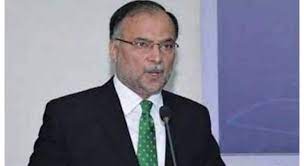F.P. Report
LAHORE: Federal Minister for Planning, Development and Special Initiatives Prof. Ahsan Iqbal on Monday said that peace, stability and persistent policies were mandatory for a strong economy.
Addressing a ceremony here, he said, “We should not make any compromise on these three things and continue our journey towards economic restoration for the next five to ten years to come out of difficulties permanently”. He said that the country paid a heavy price of former premier Nawaz Sharif’s disqualification as it shook the confidence of our friends and investors in our system. He said that no country could succeed without foreign investment in present times.
He said, “We are a nation of 240 million people whereas the foreign investment is only 1.5 billion dollars.” The minister questioned why the foreign investment did not come to Pakistan, and said that every investor looked for peace. stability, persistent policies and the judicial system which would give protection to him. While questioning decisions like disqualification of Nawaz Sharif, he said,
“We need to reform our judicial system as it is the most necessary to strengthen our economy.”
To a question, he said that the nation was aware of the Pakistan Muslim League-Nawaz’s (PML-N) performance. He said that the country was facing a number of problems, when the PML-N assumed power in 2013, but it overcame the problems and put the country on development track. However, after it, an experiment was made and a man was put into power, who did not have any experience of running the government, and it led to devastation of the economy, he added.
He said, “When the coalition government took power almost 14-months back, we made hard decisions to put the economy back on track and accepted conditions set by the International Monetary Fund in the light of the agreement made by the previous PTI government.”
He said that now Pakistan had come out of the default scenario, adding that the inflation would decrease with the strengthening of the rupee. All over the world, if the inflation touched this limit then it usually took two years time to control it, he added. It was utmost necessary that the people should decide in the next elections whether they wanted this process of development to continue or not, he said, adding that the people would make a positive decision.
The minister said that the government decided to finish its term within the constitutional period and its term would finish on August 9 at midnight. He said that after it, the caretaker government would come into existence as per the Constitution. He said that the 7th census had been officially notified and it was a constitutional requirement that new delimitation should be done as per the census.
Now it was the responsibility of the Election Commission of Pakistan (ECP) to announce the schedule for the general elections in the light of new census and the Constitution, he added. He said that only the ECP knew its preparedness about the delimitation, He said that the constitution allowed four months time for the new delimitation but only the Commission could decide whether it needed four months or two for completing the process. He said that everyone was bound to the Constitution and it would be acted upon in letter and spirit, adding that the schedule of the elections would be as per the Constitution and the law.
To a question, the minister said that he had repeated many times that the Council of Common Interests (CCI), under the chairmanship of then prime minister Imran Khan on January 13, 2021, decided that the 7th census should be handed over to the ECP for holding the next general elections.
He said that due to controversies on the 6th census, the new census was ordered and the CCI again supported the decision in 2022. “We did not make any deviation and acted as per the Constitution and CCI’s decisions which were made under the chairmanship of Imran Khan,” he added. (APP)







